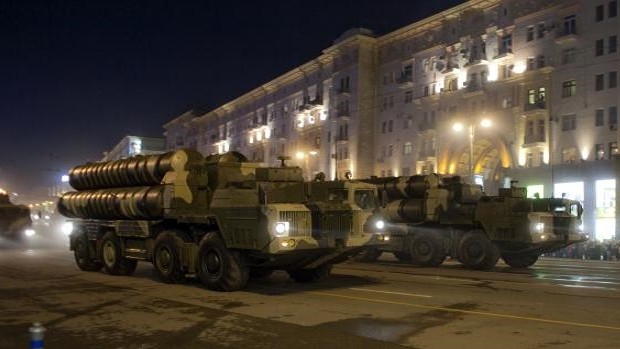
Russian army S-300 air defense missile launchers drive in a street during a rehearsal for the Victory Day military parade that will take place at Moscow’s Red Square, Russia. (AP Photo/Alexander Zemlianichenko)
The comments were made while Israeli justice minister Tzipi Livni was holding talks with Russian foreign minister Sergey Lavrov in Moscow about its decision to sell S-300 air defense missiles to Syria.
Ambassador Dorit Golender said: “I think this issue [peacekeeping in the Golan Heights] will be the main point in the negotiations, and if both parties reach agreement, then sending a peacekeepers to the Golan becomes possible. What is needed first is permission from the United Nations, and Israel is always open to resolutions in such issues.”
President Vladimir Putin said in June that Russia was prepared to send 380 peacekeepers to replace Austrian troops that were withdrawn by their government as the fighting in the country intensified. The United Nations rejected the offer, however, because the agreement reached after the 1973 war stipulates that forces from the Security Council’s permanent members—the US, Russia, China, France and the UK—are not allowed in the Golan Heights.
The issue has become more urgent due to information reportedly received by Israel that Russia was planning to deliver the S-300 missiles to Syria within weeks. Russia assured Israel two months ago that it would not deliver the missiles until the middle of next year.
Livni’s office, however, has played down the importance of the visit, saying it was aimed at discussing security issues related to terrorism with her Russian counterpart. However, reports said Livni met Lavrov yesterday and discussed “sensitive security issues” and tried to persuade his government to cancel the missile transfer.
Israel newspaper Yedioth Ahronoth quoted unnamed senior Israeli military sources as saying that there were alternatives available within the missile agreement that can be implemented, which can satisfy Syria and not harm Israel.
These alternatives include the SA-22 and SA-17 anti-aircraft missiles, which are capable of bringing down aircraft at low and medium altitudes. The modern S-300 missiles, which Syria bought a few years ago, are long-range missiles capable of bringing down aircraft at high altitudes and could theoretically hit targets in Israeli airspace from within Syrian territory.

Trackbacks/Pingbacks